November 2019 - Highlights and Hot Topics

A Message from NCCDD Chair Alex McArthur
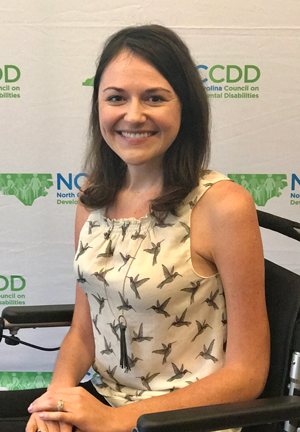 NCCDD Chairperson Alex McArthur
NCCDD Chairperson Alex McArthur
We kicked it off our final Council meeting of the year with a celebration at our annual Advocacy and Leadership Awards event. NCCDD’s Jack B. Hefner Memorial Award was given posthumously to Renate Macchirole and the Helen C. “Holly” Riddle Award was conferred on professional and advocate Karen Luken. Read more about these two special award winners.
NCCDD is now underway in year number four of our Five-Year Plan, assessing accomplishments and goals within each initiative we have funded and continue to fund. And, we will be sharing our plan for building the newest Five-Year Plan that will guide the Council from years 2022-2026. The plan will continue to focus on our mission to ensure that North Carolinians with intellectual or other developmental disabilities (I/DD) and their families participate in the design of and have access to needed community services.
And, November reminds us to be thankful for all we have! At the North Carolina Council on Developmental Disabilities (NCCDD), we are most thankful for our wonderful Council members, staff, partners, advocates, families and community across the state who keep working to build an inclusive state for people with disabilities.
From all of us at NCCDD, we wish you all a very Happy Thanksgiving!
The NCCDD is always here to help. Please check out our website, share your ideas, and stay in touch.
Alex McArthur, NCCDD Chair
Public Policy Update as of 11/15/19

FEDERAL
Health Care Coverage
Now through December 15, individuals can enroll in the Affordable Care Act. State-specific options can be found at www.healthcare.gov. Financial assistance may be available for people with low or moderate incomes. Currently enrolled beneficiaries who do not take action will be automatically re-enrolled in the current plan. Re-enrollment is also an important opportunity for people to report any changes in income. You can find enrollment help here.
In Congress, three House committees have approved the Lower Drug Costs Now Act of 2019 (This bill requires the Centers for Medicare and Medicaid Services to negotiate prices on insulin and at least 25 drugs each year for Medicare Advantage and Medicare Part D plans. The bill also creates an out-of-pocket limit of $2,000 for Medicare Part D plans. Low income subsidy recipients would also forgo co-payments on generic medications.
Higher Education
The House Committee on Education and Labor approved the College Affordability Act (H.R. 4674) on October 31. As a comprehensive reauthorization of the Higher Education Act, this bill reauthorizes the Transition and Postsecondary Programs for Students with Intellectual Disabilities (TPSID). It also addresses college affordability in a number of ways including increases to Pell grants, improvements to student loan programs and by providing federal dollars to states offering free community college education. In addition, this legislation requires colleges to accept an existing IEP or 504 plan as evidence of disability when requesting accommodations. More information can be found in the Consortium for Citizens with Disabilities (CCD), of which the National Association of Councils on Developmental Disabilities is a member, Education Task Force Letter.
Respite Care and Direct Support Professionals
November is National Family Caregiver Month, and we’ve seen a focus on caregiving and community living in Congress. On October 31, the Senate Committee on Health, Education, Labor, and Pensions approved the Lifespan Respite Care Program Reauthorization Act of 2019 (S.995). The Lifespan Respite Care Program, which provides federal funds via grants to states, helps strengthen coordinated state lifespan respite systems, helps family caregivers identify and use respite funding sources, encourages community and faith-based partnerships, and trains respite workers and volunteers.
On November 1, The Consortium for Citizens with Disabilities, along with the National Domestic Workers Alliance, hosted a Congressional briefing titled "The Hidden Crisis of Care in the U.S. - Addressing the Homecare Workforce Shortage." The briefing focused heavily on the care shortages and the need for federal-level investment and focus to alleviate strain on families and individuals being served in the community. Information on the direct support professional bill, Direct Creation, Advancement, and Retention of Employment (CARE) Opportunity Act (S.2521/H.R.4397), can be found in September’s HHT.
Transportation
The Department of Transportation (DOT) hosted the Access and Mobility for All Summit which provided an opportunity to learn about government efforts to improve accessible transportation and announce new initiatives including The Complete Trip Deployment solicitation which provides $40 million to communities to promote independent mobility and $5 million in cash prizes for inclusive design of automated vehicles.
Supplemental Security Income
On October 30, ten senators reintroduced the Supplemental Security Income (SSI) Restoration Act of 2019 (S.2753). The bill would revise and enhance the SSI program by updating the general earned income disregard to $123 per month, updating the earned income disregard to $399 per month, and updating the resource limits to $10,000 for an individual and $20,000 for a couple. The SSI Restoration Act would repeal SSI's in-kind support and maintenance provisions as well as penalties for resource transfers, marriage, and state tax credits.
STATE
Legislative Budget
The state continues to operate under last year’s budget. As a reminder, the approved legislative budget was sent to the Governor who vetoed the budget bill because Medicaid expansion was not included. While the House voted to override Gov. Roy Cooper’s June veto of the state budget bill for fiscal years 2020 and 2021; at this point, the Senate has not voted on this because they do not have enough votes for an override.
The budget includes several positive items for people with I/DD including Innovations Waiver slots, increases in some direct support professional wages and a study to expand these increases, and ten-year plan to address the waiting list. In addition, it includes Medicaid Transformation Funds that are needed to move forward with the state’s plan. There are some concerning areas of the budget such as cuts to DHHS funding, continuing reductions to the LME/MCOs, and moving some DHHS offices from Raleigh to Granville County. While all of these items are a part of the discussion/negotiation between the Governor’s office and the General Assembly, the most contentious areas seem to be Medicaid expansion (which is not in the budget) and the amount of allocation for teacher raises.
The legislature reconvened on November 13th and it appears that the focus will be on Congressional redistricting. While we hope that budget talks will continue, it will likely be January before the budget is addressed.
Medicaid Transformation
Enrollment for the Standard Plan is currently underway. Open enrollment will close statewide Dec. 13, 2019. Letters were sent out to beneficiaries.
- People with intellectual or other developmental disabilities (I/DD) who are in the NC Innovations Waiver should NOT have received a letter
- People who have Medicaid as their health insurer and are using Medicaid b3, state funded (NCTracks), or other Medicaid services (e.g. ABA through Medicaid, Research-Based Behavioral Health Treatment) and are NOT on the Innovations waiver, received a letter indicating options to enroll in a Standard Plan or remain in the Tailored Plan. It is important to know that enrolling in the Standard results in losing access to any services through the LME/MCOs.
- People with I/DD who have Medicaid as their health insurer and are not connected to the LME/MCO received letters their services will be managed by one of the statewide Prepaid Health Plans (PHPs) or the one regional PHP that will offer the Standard Plans. Those individuals will tap into the assistance of the NC Enrollment Broker to choose a plan. (www.ncmedicaidplans.gov; 833-870-5500).
In the event someone is assigned to a Standard Plan and feels they need to be in Tailored Plan, there is a “Request to Stay” form that can be submitted to request to be in the Tailored Plan.
Medicaid Managed Care benefits for the Standard Plan are scheduled to begin Feb. 1, 2020. However, the budget stalemate may affect this start date. If there is not an approved budget which includes the funding necessary for the transition to Medicaid managed care by the end of November, the implementation will likely be delayed.
The RFP for the Tailored Plan is in the final stages of approval and is scheduled to be released in February. The Behavioral Health/IDD Tailored Plan has a projected launch in July 2021. Learn about the design of the program. The implementation of the Standard Plan creates an opportunity for identifying key elements, such as the development of the provider network and enrollment of beneficiaries, which will be crucial for effective roll-out of the Tailored Plan.
For any questions or comments about Medicaid transformation, emails can be sent to the following address: [email protected]
Redistricting
In early September, a panel of three Superior Court judges unanimously struck down 2017 House and Senate maps giving lawmakers two weeks, until Sept. 18, to draw new districts in “full public view” without the use of election data. The three-judge panel found they used unconstitutional partisan gerrymandering to harm Democrats when they created the 2017 legislative maps.
Legislators redrew a total of 21 Senate districts and 56 House districts in a process that was much more transparent than in the past and submitted to the court. The plaintiff, Common Cause, objected specifically to five county groupings: Columbus-Pender-Robeson; Forsyth-Yadkin; Cleveland-Gaston; Brunswick-New Hanover; and Guilford. On October 28, 2019, a three-judge panel of North Carolina’s superior court approved new state legislative district maps.
ADA Design: Curb Cuts, Crosswalks and Sidewalks Workshop/NCCDD’s NC ADA Network Initiative
The NC ADA Network initiative collaborated with the North Carolina Department of Transportation, the City of Raleigh and the United States Access Board to offer a training titled ADA Design: Curb Cuts, Crosswalks and Sidewalks in Raleigh on October 31 and repeating on November 1. Scott Windley, Accessibility Specialist with the U.S. Access Board who worked at the Center for Universal Design in Raleigh from 1995-1997, conducted the training.
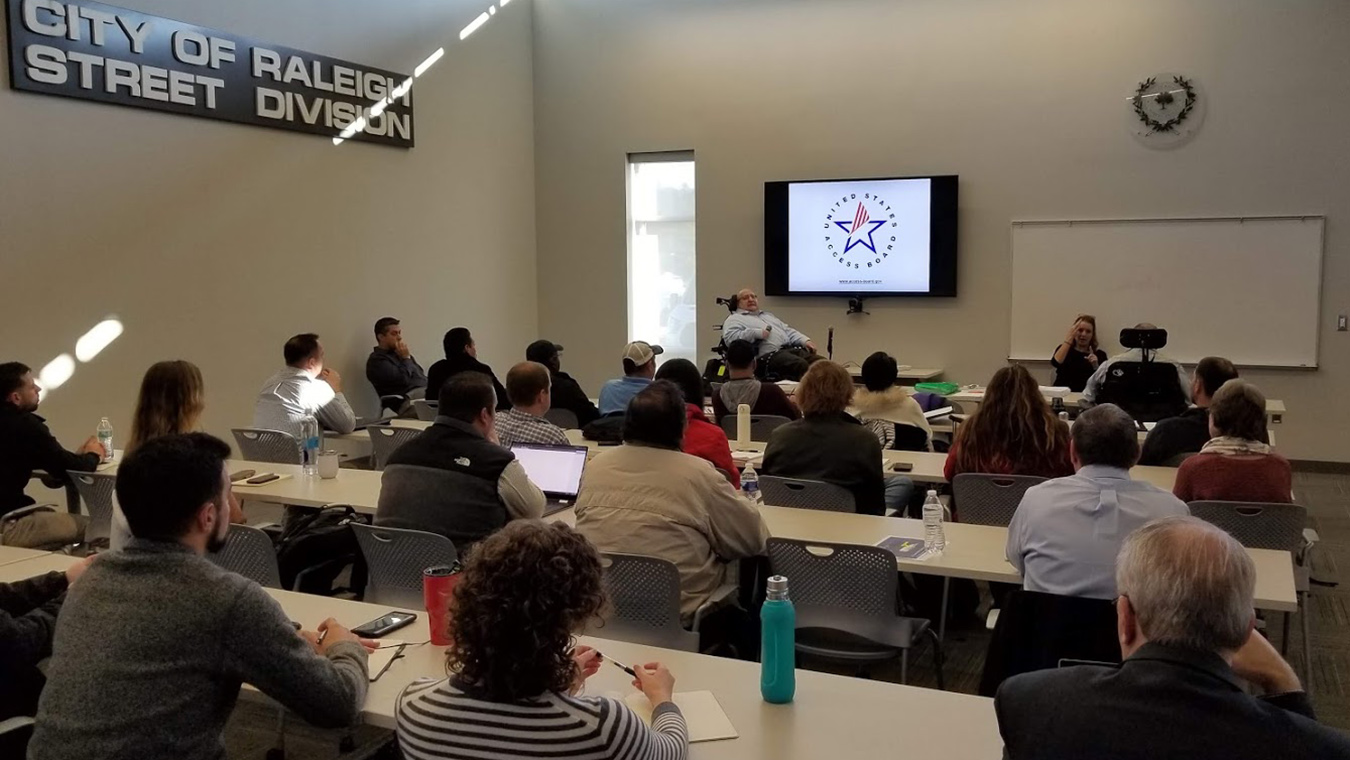 Scott Windley presents to a full room.Approximately 40 individuals attended each day, including self-advocates from grassroots groups that make up the NC ADA Network, architects, engineers, inspectors and other transportation staff.
Scott Windley presents to a full room.Approximately 40 individuals attended each day, including self-advocates from grassroots groups that make up the NC ADA Network, architects, engineers, inspectors and other transportation staff.
Windley presented an extensive PowerPoint with many photos and three training videos to illustrate concepts and examples of accessible design related to public rights-of-way to help everyone at the training recognize problems with existing pathways and be able to fix them or advocate for better accessibility.
NC ADA Network Coordinator Karen Hamilton stated, “I learned that research shows that adding a section of sidewalk that connects a bus stop to the nearest crosswalk can increase fixed route transit ridership and decrease dependence on paratransit. The savings in paratransit costs can pay for the construction of the sidewalk in less than 6 months.”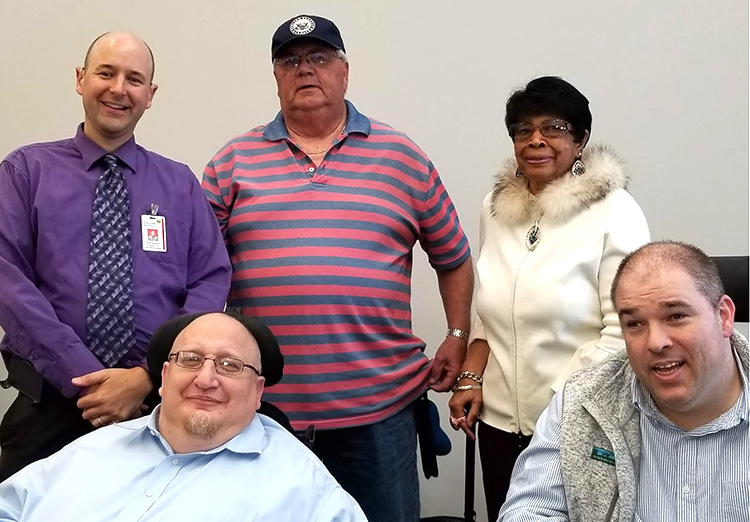 Self-advocates Group Photo: Philip Woodward, Scott Windley, Larry Herring, Marge Clemons and Jonathan Ellis
Self-advocates Group Photo: Philip Woodward, Scott Windley, Larry Herring, Marge Clemons and Jonathan Ellis
Windley shared how Montgomery County, Maryland did this to reduce reliance on paratransit, which costs an average of $77 per trip there. Windley dispersed specific advice to the group, telling them to never install a rail on a curb ramp and that cookie cutter (one size fits all) ramps won’t fit all sidewalks. Windley quizzed each audience at the end of the day by showing pictures of rights-of-way that are not fully accessible and asking them to identify what is wrong in each photo.
Self-advocate Ronnie Marshall commented that the training “had curb appeal.”
For more information about the NC ADA Network, go to https://www.nccdd.org/nc-ada-network.html
NCCDD Recognizes Disability Advocates
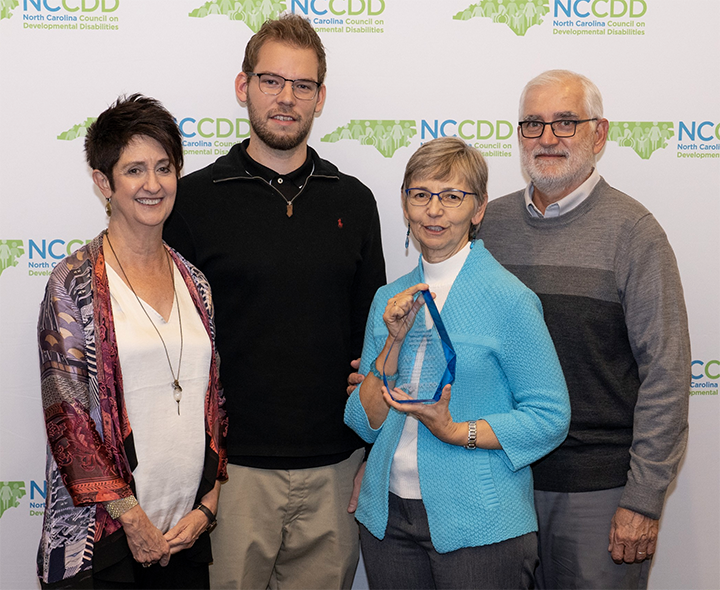 Winner of the Riddle Distinguished Service Award Karen Luken (in blue) with her family and Holly Riddle (right)NCCDD held its annual awards event on November 6, 2019 at the Hilton Garden Inn, Cary, NC. Two people from the state of North Carolina were honored for their work and advocacy on behalf of individuals with intellectual or other developmental disabilities (I/DD).
Winner of the Riddle Distinguished Service Award Karen Luken (in blue) with her family and Holly Riddle (right)NCCDD held its annual awards event on November 6, 2019 at the Hilton Garden Inn, Cary, NC. Two people from the state of North Carolina were honored for their work and advocacy on behalf of individuals with intellectual or other developmental disabilities (I/DD).
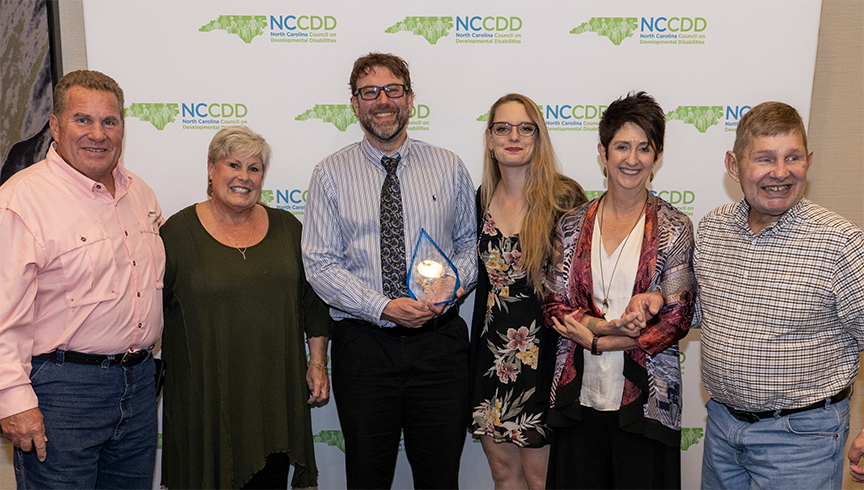 Winner of the Hefner Memorial Award, the late Renate Macchirole, is represented by her family, members of the Heftner family and Holly Riddle The Jack B. Hefner Memorial Award is given to celebrate the vision and achievement of North Carolina's families and people with I/DD. This year the award was presented posthumously to Renate Macchirole, formerly of Kill Devil Hills, NC.
Winner of the Hefner Memorial Award, the late Renate Macchirole, is represented by her family, members of the Heftner family and Holly Riddle The Jack B. Hefner Memorial Award is given to celebrate the vision and achievement of North Carolina's families and people with I/DD. This year the award was presented posthumously to Renate Macchirole, formerly of Kill Devil Hills, NC.
Karen Luken was honored with the Helen C. “Holly” Riddle Distinguished Service Award by the Council. The award is the highest recognition given by the NCCDD to professionals who have made lasting contributions towards improving opportunities, breaking down barriers, and promoting increased quality of life for people with intellectual or other developmental disabilities.
You can read more about the achievements of our award winners here.
Council Member Profile: Meet Donna Spears
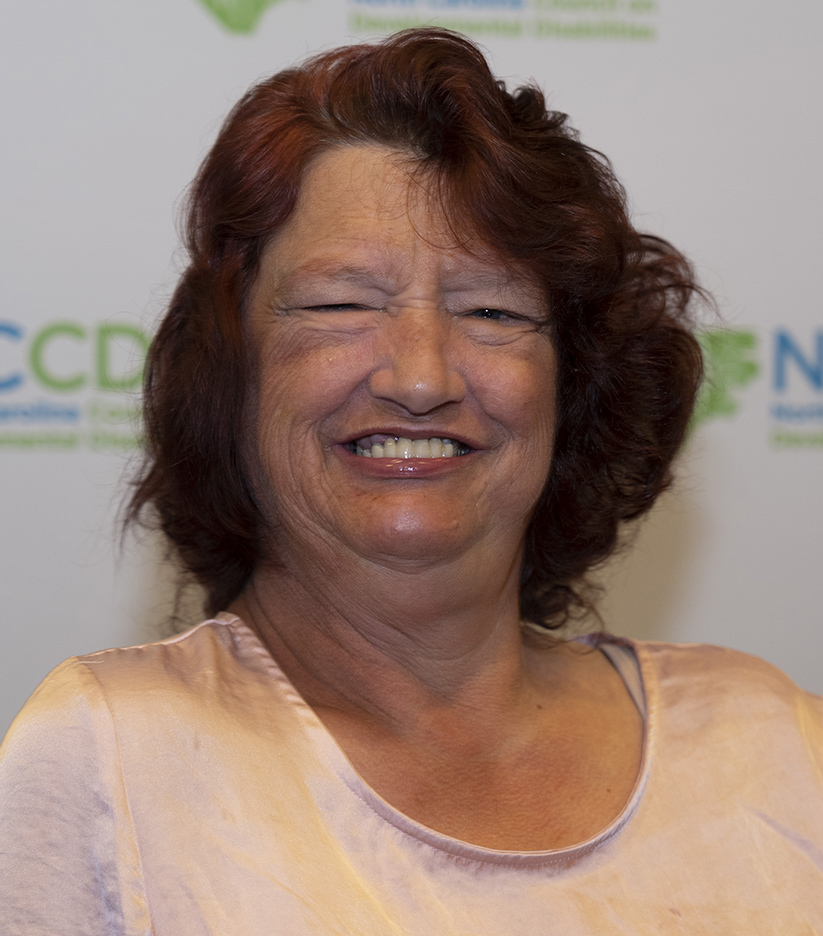
“I’m dedicated to my work of advocating to inform our leaders about the changes they need to make for people with disabilities,” explains Donna Spears when asked to describe her mission.
Spears is a new North Carolina Council on Developmental Disabilities (NCCDD) member, recently appointed by Governor Roy Cooper. A resident of Richlands, NC, Spears attended both Louisiana State University and McNeese State University where she earned a Bachelors’ degree in Psychology and an Associate Degree in the Art of Psychology with a minor in History.
Spears’ plans to support the work the Council has done on employment and housing incentives and to add her expertise to the initiatives currently promoting waiver slots. “[The Council] has a wide range of initiatives that are working really well,” Spears says.
Spears points to low government funding as the issue behind the low number of waivers, teachers not receiving education on how to work with students with disabilities and the lack of employment for people with disabilities. She believes these are all major issues for the people of North Carolina.
Currently a homemaker, and a person with cerebral palsy, Spears was encouraged by Chris Egan, the Senior Director for Employment Services to apply for the opening on the NC Council. “I knew every state had a disability council. I want to be involved in making systems changes,” Spears adds.
En Espanol - November 2019
Audio - Highlights and Hot Topics
